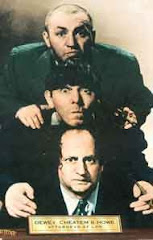I have been moonlighting. On the weekends, I've been working at an urgent care clinic in the area. I admit that I've been avoiding family practice. I'm not sure why. As usual, of course, I've done lots of self-examination about it.
Part of the reason I fled was my inexperience. Medical school and residency teach you lots of things. As most people can agree, however, they do little to teach you about communicating with sick people. That's actually the hardest part. I had a very naive vision of my role and the sorts of relationships I would have with my patients. I was looking backwards, to a much simpler time, when people either liked or at least wanted to like their doctor. It's different now. We often have to fight the perception that we are cheats, liars, thieves, or all of the above. I had no idea how in the world to answer that. My feelings of disappointment led me to act defensively - to assume the worst.
Another problem I had was the feeling of being overwhelmed. "General medicine" is such an inocuous term for what it really is - never being surprised by anything. There is a difference, though, between "never being surprised" and "always knowing the answer". With time and more experience, I've found that there are ways of breaking this fact to the patients that don't make them feel that they've just thrown away a co-pay.
In a funny way, it was immersing myself in exactly what I feared that allowed me to grow. Unwittingly, the doctor who feared and resented the attitudes of his patients and who feared having to say "I don't know" placed himself in the one job in the world where that is almost all there is - Occupational Medicine. I don't just have occasional bad interactions now - they are constant. And this conversation happens nearly every day:
"Well, Mr. Smith, I've reviewed your MRI and the results are negative. That means there appears to be nothing wrong with your knee"
"Well, I can tell you there is definitely something wrong with it!"
"Well, unfortunately, sir, the last three examinations I've performed on your knee were negative, the examination by the physical therapist was also without objective findings, and now the MRI fails to show anything. There may very well be something wrong with you, but it is so subtle as to be invisible to me, other health professionals, and the MRI machine."
"So what's wrong with my knee?!?"
So when I started back with the general medicine stuff, it didn't seem so bad this time. I also found that the things I was most afraid of - the emergency medicine things - aren't nearly so daunting as they used to be. And even though I'm exhausted after working basically 21 days straight with five more to go before the first real day off, I think I might be able to do this GP thing again after all. Have Medicine and I reconciled? It's a bit too early to know for sure, but it's a good start.
Why Won’t My eSIM Transfer? Troubleshooting Explained
11 months ago











1 comment:
LOL...My husband could relate to your comments! He just graduated his residency program this year in Emergency Medicine--so he sees that "knee patient" ALL THE TIME.
He's found that it's a real art to make the patient feel they've been cared for, when all he's done is rule out that anything is actually wrong.
And I understand what you mean about people's perceptions of docs: they assume all doctors are conspiring with the drug companies are over-charging and over-prescribing, only to make their patients sicker.
If there is some great partnership with physicians, drug companies, insurance companies and diagnostic testing, my husband and I surely aren't in on it!
Post a Comment